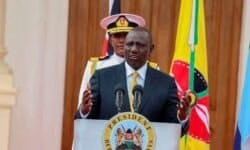
Government rolls out new retirement benefits package
The government wants to revise the pensions scheme to enable Kenyans save for a retirement home and pay for medical care after retirement.
According to the draft National Retirement Benefits Policy released by the National Treasury, a significant number of Kenyans are facing challenges in accessing housing and healthcare services after retirement.
The Treasury pointed out that numerous retirement plans did not allow individuals to save for the two primary needs that make up a significant portion of expenses for Kenyans over the age of 65.
“The sector plan for population, urbanisation, and housing highlights the challenge of providing adequate, decent, and affordable housing for most Kenyans. Additionally, the growing population of individuals above 65 years old is putting pressure on the existing mechanism for providing elderly care, which is currently inadequate. This issue is further worsened by the breakdown of the family support system,” reads the policy document in part.
Speaking to the press at his office, Treasury CS Prof Njuguna Ndungu noted that it was prudent for the government to update existing laws in order to provide a regulatory framework for retirement schemes to offer savings plans, specifically for retirement homes and elderly care, by implementing measures that motivate employers and employees to contribute to Post-Retirement Medical Funds.
Currently, a majority of Kenyans are saving for their retirement through monthly salary deductions which allow them to receive a monthly stipend after retirement to cover their basic needs. The National Social Security Fund (NSSF) is one of the prominent state-owned institutions that provide retirement benefits.
“Furthermore, the government is looking to establish guidelines that will avert Kenyans from accessing retirement benefits before reaching the age of 65. Additionally, there are plans to introduce retirement savings and benefits for individuals working in the informal sector,” Prof Njuguna said.
“In order to boost the income replacement rate for individuals in the retirement benefits sector, the government will assess the existing legal framework to implement sub-accounts within retirement benefits schemes. These sub-accounts will be specifically designed to meet the short-term financial requirements of scheme members,” said Prof Ndungu.
The government will also provide measures to ensure short-term contract employees enroll into retirement benefits arrangements.
